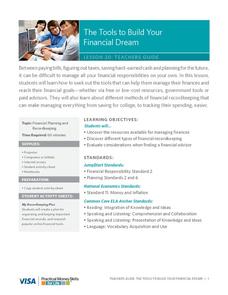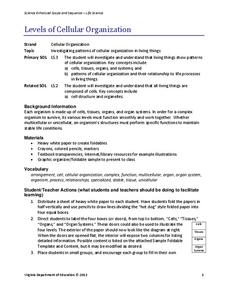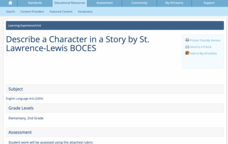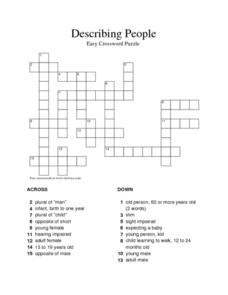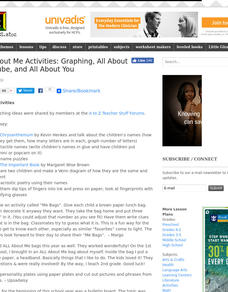Inside Mathematics
Graphs (2006)
When told to describe a line, do your pupils list its color, length, and which side is high or low? Use a worksheet that engages scholars to properly label line graphs. It then requests two applied reasoning answers.
EngageNY
Efficacy of Scientific Notation
How many times could California fit into the entire United States? Pupils use scientific notation to find the answer to that question in the 12th installment of 15 lessons. It asks scholars to write numbers in scientific notation and...
EngageNY
Definition of Translation and Three Basic Properties
Uncover the properties of translations through this exploratory activity. Learners apply vectors to describe and verify transformations in the second installment of a series of 18. It provides multiple opportunities to practice this...
British Council
Unit 3: Organising Your Emails
Inbox out of control? Let's clean it up! Learners explore the components of an e-mail system during the third lesson in a series of nine that focus on career education and skills. After reading a short passage, individuals identify the...
Saint Louis Zoo
Introduction to Natural Selection: Darwin & Lamarck
Charles Darwin and Jean Baptiste Lamarck are credited for developing the theory of natural selection. After teaching your beginning biologists about acquired characteristics, they read the included selection and answer questions that...
Visa
The Tools to Build Your Financial Dream
When it comes to all the ways money management and financial responsibility weave into our daily lives as adults, make sure students are prepared to locate resources for managing their finances, such as a financial advisor.
Lisa Staab Shadburn
Play Therapy Activities to Enhance Self‐Esteem
Discover activities to help learners increase self-awareness, build peer and family relations, and develop positive self-esteem. Here you'll find six suggestions for instilling a sense of confidence and self awareness in youngsters. Each...
Virginia Department of Education
Levels of Cellular Organization
What an eccentric way to learn about each level of cellular organization! Allow emerging biologists to utilize white paper and create their own foldable charts to describe each level of organization in the body. You may also adapt the...
Curated OER
Kids Can Make a Difference
What is a philanthropist? We can all be philanthropists! After assessing the needs of the school and listening to literature about how they can help others, primary learners develop a class project and maintain a journal of their...
Curated OER
The Ants Go Marching
Integrate art, math, life science, music, and fun in this beginning addition and subtraction activity. Children kinesthetically represent adding and subtracting numbers to 10; they stand up one at a time as you count forward and sit down...
Curated OER
Esperanza Rising
If you are considering reading Esperanza Rising with your class, this fine packet of worksheets may be what you're looking for. Students read the book in groups, utilize the packet to keep on track with their reading, and respond to what...
Curated OER
Strategies to Build Comprehension Skills
Reading strategies that realy work. Here is an introduction of six active reading strategies to improve reading comprehension. Super helpful for newer teachers.
Curated OER
What We Eat, Where We Sleep: Documenting Daily Life to Tell Stories
This is not just a New York Time article to read, this is a set of amazing activity ideas all related to the slide shows "Breaking Bread Everywhere" and "Where Children Sleep." Your class can view each show, read about what they mean...
Curated OER
Empire to Independence
Here is a wonderful presentation, perfect for setting the stage for the Revolutionary War. Containing great information and images, it acts as a timeline of events starting with the French Indian War and ending with the dawn of the...
Curated OER
Adjectives to Describe Everyday Situations
In this adjectives worksheet, students use the adjectives given to describe the situations in the pictures and create a short conversation. Students are given 12 pictures.
Curated OER
Describe a Character in a Story
Second graders should be familiar with characters of a story and adjectives. The students should have some knowledge of Kidspiration. After reading a story, they will use Kidspiration and create a character web to describe a character in...
Curated OER
Describing People Easy Crossword Puzzle
Young learners discover adjectives to match each small description provided. While this crossword is labeled easy, I would recommend having upper elementary learners help youngsters, if possible.
Curated OER
All About Me
This is an awesome resource for any elementary or middle school teacher about to start a new school year! This resource includes an extensive list of activities for introducing the members of your class to each other. Some of the ideas...
EngageNY
Describing Variability Using the Interquartile Range (IQR)
The 13th lesson plan in a unit of 22 introduces the concept of the interquartile range (IQR). Class members learn to determine the interquartile range, interpret within the context of the data, and finish by finding the IQR using an...
K12 Reader
Describe It with Adjectives
Put children's descriptive writing skills to the test with these fun collaborative writing activities. Presented with the picture of an object, young writers are are tasked with creating a description that provides enough detail for one...
Curated OER
Singular Adjectives Worksheet 3- Mi novio es/ Mi novio no es
Who is your boyfriend or girlfriend? Have each learner choose a friend to describe with the use of adjectives. Basic information includes where he or she is from, the high school they attend, and basic traits they do or don't have....
Curated OER
Describing Data
Your learners will practice many ways of describing data using coordinate algebra in this unit written to address many Common Core State Standards. Simple examples of different ways to organize data are shared and then practice problems...
EduGAINs
Introduction to the Great Depression—Canadian and World Studies
Ah, the classic business cycle model: recession, depression, recovery, prosperity. And then there was the Great Depression. Groups investigate the economic conditions that led to and social movements of the 1920s that great out of the...
EngageNY
Describing a Distribution Displayed in a Histogram
The shape of the histogram is also relative. Learners calculate relative frequencies from frequency tables and create relative frequency histograms. The scholars compare the histograms made from frequencies to those made from relative...
Other popular searches
- Words to Describe People
- Precise Adjectives to Describe
- Writing to Describe
- Words to Describe Location
- Describe How to Get to Safety
- Words to Describe the Past







